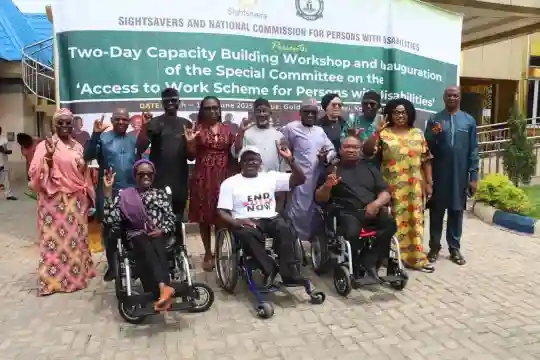The National Commission for Persons with Disabilities (NCPWD) has inaugurated a Special Committee to oversee the implementation of the National Access to Work Scheme. The event, organized in partnership with Sightsavers, took place during a two-day workshop at the Golden Dabis Hotel, Keffi, Nasarawa State.
This initiative is part of a broader effort to encourage inclusive hiring practices in Nigeria’s public and private sectors. The scheme is built on a newly developed framework launched in January 2025 by the Commission, Sightsavers, and TAF Africa. It provides guidelines, incentives, and support systems to promote equal access to employment for the over 35.5 million Nigerians living with disabilities.
The capacity-building workshop focused on key elements such as workplace accessibility audits, the provision of assistive technologies, and policy support to promote inclusive workforce development. These steps aim to ensure that persons with disabilities are not left out of Nigeria’s economic growth.
While delivering his keynote address, Hon. Ayuba Gufwan, Executive Secretary of the Commission, stated, “This initiative is not merely another event; it is a bold step forward in the struggle for equity, dignity, and full inclusion of persons with disabilities in our national workforce. We are establishing systems, policies, and practices that make employment accessible, inclusive, and sustainable.”
He added that the Access to Work Scheme supports the goals of President Bola Ahmed Tinubu’s Renewed Hope Agenda by aligning with inclusive governance and economic empowerment strategies. The initiative is also expected to reduce the unemployment rate among persons with disabilities, which remains disproportionately high.
The legal foundation of the scheme is rooted in the Discrimination Against Persons with Disabilities (Prohibition) Act, 2018, and the United Nations Convention on the Rights of Persons with Disabilities (UNCRPD). Section 28 of the Act guarantees the right to employment, while Section 4 mandates the provision of reasonable accommodation in the workplace. Similarly, Article 27 of the UNCRPD requires equal work rights, non-discrimination, and the promotion of inclusive job opportunities.
“Together, these instruments not only obligate us—they empower us to build systems that respect and realize these rights,” Hon. Gufwan said.
He also acknowledged the support of development partners. “We deeply appreciate Sightsavers Nigeria for their technical support and partnership, and TAF Africa for their continued commitment to disability inclusion.”
Mr. Lawrence Idemudia, Director of Social Integration at the Commission, described the event as a turning point. “This gathering marks a critical milestone in our collective effort to advance social integration, equity, and inclusive development for persons with disabilities in Nigeria,” he said. He affirmed the Commission’s continued commitment to breaking down barriers through strategic advocacy and collaboration.
The highlight of the workshop was the formal inauguration of the Special Committee, which includes members from the Commission, Sightsavers, the Joint National Association of Persons with Disabilities (JONAPWD), TAF Africa, the Federal Ministry of Labour and Employment, the Federal Civil Service Commission, the Chartered Institute of Personnel Management (CIPM), and the Nigerian Employers’ Consultative Association (NECA).
During the technical session, Dr. Adebukola Adebayo, Technical Assistant to the Commission, led discussions on both global and local experiences related to Access to Work Schemes. He provided training on how to effectively develop and implement the national framework.
Read Also: 2026 Will Be Remarkable for Studying ‘Public Relations’ as a Profession – FG
The session concluded with practical strategies from stakeholders, setting a strong foundation for effective implementation of the scheme. Participants left with renewed commitments to build a more inclusive labour market in Nigeria, addressing issues like employment discrimination, accessibility, and disability rights.

